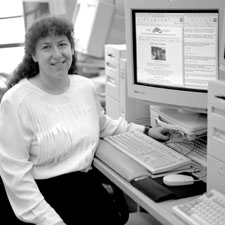 |

Getting Engaged Laura Mengel and her Fermilab colleagues use technology to support a new approach to teaching and learning. by Judy Jackson Students learn best when they take an active role in the learning process; and, properly used, technology can help make that happen in the classroom. That’s the premise behind the LInC program, begun at Fermilab in 1994 under the leadership of the Computing Division’s Laura Mengel. LInC (it stands for Fermilab Leadership Institute Integrating Internet, Instruction and Curriculum) is a rigorous graduate course for K-12 teachers that aims to replace the standard "lecture-and-test" classroom model with what educators call "engaged learning," in which the students seek out—and hopefully absorb— new knowledge for themselves. In the 14-week LInC course, each teacher creates an on-line classroom project designed to get students engaged in exploring a particular subject—water inthe environment, say, or Revolutionary War heroes—using the World Wide Web and the Internet as resources. The teacher’s role changes from lecturer and resident expert to coach, guiding the students in using the Web and other resources to connect with true experts on the subject and collaborate with students in other classrooms, far and near, who are at work on similar projects. In the five years since LInC began, Mengel and a group of master teachers from neighboring districts have taken 200 teachers from 75 school districts in 18 states through the program. Initially, the teachers came to Fermilab to take the course face-to-face (f2f in the jargon). Now, Mengel has taken LInC completely on-line, a format that allows a "class" of extraordinary diversity. Teachers from rural Montana and definitely non-rural Paterson, New Jersey, for example, can compare notes during the weekly two-hour on-line chat. Mengel divides her time between the LInC project and her responsibilities for providing support for 18 Computing Division Web servers, including the mainFermilab Web server and the shared Web server for experiments and projects. She says the main challenge for teachers who take the LinC course is less in mastering the electronic technology than in changing the way they think about teaching. "We’re asking them to explore and try out a different approach to teaching and that’s a tall order," Mengel said. To keep the online course highly interactive, Mengel uses weekly on-line chats, e-mail coaching, an electronic bulletin board, a list-serve, and "we call on the phone, we go there to see them—whatever it takes, because this can be a hard change for them to make." The effort seems to be paying off. In contrast to many on-line courses, LInC has a very small drop-out rate and a growing cadre of enthusiastic teachers, some of whom go on to become LInC instructors themselves. From the outset, one of LInC’s goals has been to equip teachers to work with others in their home districts, to spread the gospel of the effective use of technology in engaged learning. And they do become believers. "In all honesty," wrote one LInC graduate, "it’s the best course I’ve ever taken. It’s like night and day. Someone turned on the light when I took this course as to what teaching should be all about." To see the home page for the LInC program:
http://www-ed.fnal.gov/lincon
|
| last modified 6/18/1999 email Fermilab |
FRLsDFx9eyfrPXgV